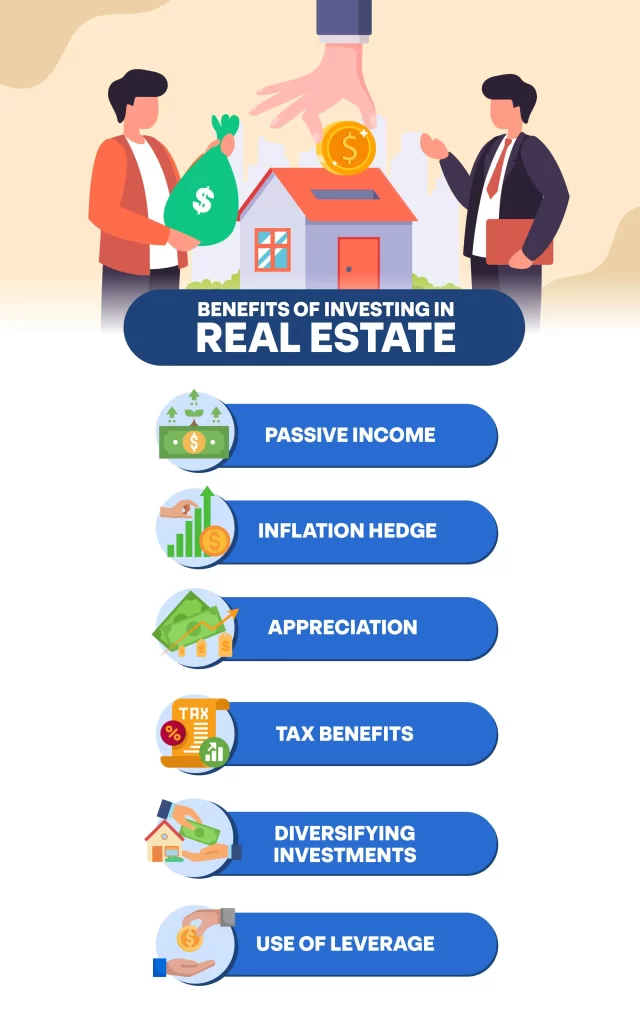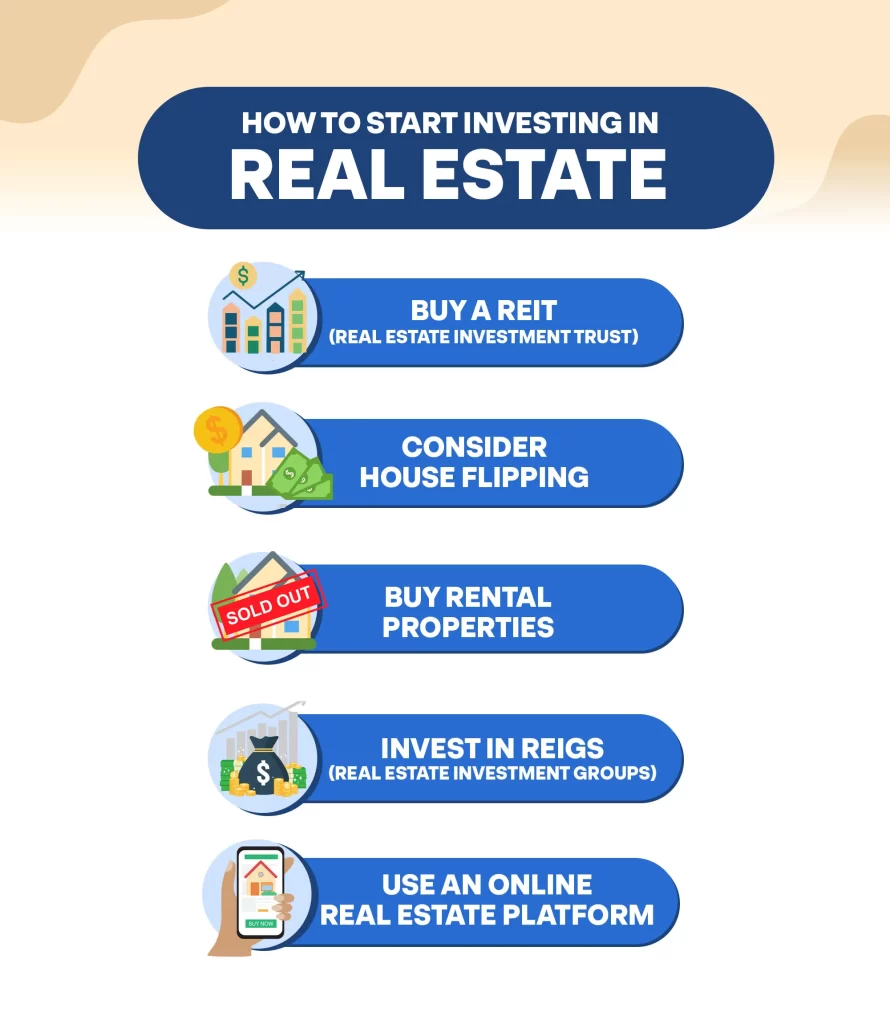People invest in things for many reasons. Usually, they invest in growing their money over time, generating income, saving up for a specific goal, or achieving financial independence. Investments also come in many forms: stock or share of ownership in a company, bonds, jewelry, mutual funds, artworks, cryptocurrencies, and real estate.
Investing in real estate is one of the most popular ways people earn money. And if you’re curious about how to start investing in real estate, there are many ways to do it as a beginner. In this blog, you’ll learn tips and things to know before investing in real estate that can make you a pro-investor.
Is it a good idea to invest in real estate?
Investing in real estate can be a good idea because it offers the potential for long-term financial growth. Real estate properties can appreciate over time, allowing investors to build equity and generate rental income. However, it’s essential to research and understand the local market conditions before making investment decisions.
Is real estate a better investment than stocks?
Real estate and stocks are different types of investments with advantages and risks. Real estate can offer stability and potential income through rental properties, while stocks provide opportunities for growth and dividends. The choice between the two depends on individual preferences, risk tolerance, and financial goals. Diversifying investments and consulting with a financial advisor for personalized advice are advisable.
How to invest in real estate as a beginner?
As a beginner, learning the basics before investing in real estate is essential. Start by educating yourself about different types of properties and the local market. Set a budget and determine your investment goals. Consider working with a real estate agent or joining investment groups to gain knowledge and guidance. Finally, conduct thorough research on potential properties, evaluate their growth and rental income potential, and carefully assess the financial risks involved before making any investment decisions.
Things To Know Before Investing in Real Estate
Before you start investing in real estate, you must learn basic things about it before you can dig deeper into the more technical stuff. For starters, real estate investing is not a one-size-fits-all and there are different types to consider:
1. Wholesaling
Wholesaling is one of the most popular ways many beginners start investing in real estate. This type of investing involves finding properties at a low price then reselling them to other investors for a profit. For this method, the property investor does not make any repairs or renovations after their purchase. Instead, they directly sell it as is to the market.
2. Buy and Hold
This is a real estate investment strategy that entails purchasing and retaining a property over an extended period to generate rental income and increase value over time. Buy-and-hold investors often seek properties in stable or rising areas with high rental depreciation.
3. Rehabbing
Rehabbing is a real estate investment technique in which you buy a distressed home, renovate it, and then resell it for a profit. Rehabbers often hunt for properties that are undervalued or in need of extensive repairs or renovations and then invest time and money to increase the value and marketability of the property.
Along with learning the types of real estate investment, you should also familiarize yourself with the terms a property investor uses. Here are a few examples:
4. Annual Percentage Rate (APR)
The annual percentage rate is the interest rate on a loan that includes any fees or levies. It indicates the overall cost of borrowing money over a year.
5. Deed
A deed is an official legal instrument that facilitates the transfer of property ownership from one party to another.It contains a description of the property, the names of the purchasers and sellers, and any other pertinent information concerning the sale.
6. Escrow
Escrow is when a neutral third party holds monies and papers linked to a real estate transaction until all sale conditions are completed. This can include the buyer’s down payment, the seller’s deed, and any other sales documentation.
7. Fair Market Value
The fair market value of a property is the price at which it would sell on the open market if both the buyer and seller are competent and motivated and there are no unique circumstances or constraints.
8. Lien
A lien is a legal claim or encumbrance on real estate, typically for an unpaid obligation. Mortgages, tax liens, and judgments are all examples of this. The creditor may be able to forcibly sell the property to recoup their debt if the lien hasn’t been paid.
Benefits of Investing in Real Estate
Investing in real estate possesses many benefits for a property investor.
1. Passive Income
Investing in real estate creates consistent cash flow, giving a passive income stream to supplement your other sources of income. This is especially appealing to retirees or those seeking additional income streams.Owning rental properties like apartments or short-term rentals is a way to do this.
2. Inflation Hedge
Inflation raises the expense of living while decreasing the purchasing power of money. On the other hand, real estate tends to increase in value over time, frequently faster than inflation. This means that by maintaining or increasing in value over time, investing in real estate can help insulate investors from the detrimental consequences of inflation.
3. Appreciation
One of the things to know before investing in real estate is that properties increase in value over time, depending on some factors like the following:
- Inflation – When there is inflation, the currency’s value falls, and the prices of products and services rise. This implies that the value of real estate property, a tangible asset, also increases. Housing prices tend to rise when there is inflation. This is because real estate is a limited resource, and the supply of new homes is limited, creating demand.
- Location – A property’s location can also affect its market value. For many buyers, a desirable location for properties includes accessibility to amenities, proximity to works and schools, nature, and the residents’ lifestyle.
- Renovations and Upgrades – Depending on the project, upgrading or upgrading a home can increase its value and attractiveness to potential buyers or renters.
- Government Policies – Government regulations and policies for home buyers, like tax incentives and zoning regulations, can affect property value because it affects the housing supply and demand.
- Demographic Changes -The influx of young professionals or retirees can also impact the property’s value within a given area because it affects the demand for housing in the area.
4. Tax Benefits
Investing in real estate also provides tax benefits for home buyers. This is because home buyers can deduct the taxable income earned by the property. In addition, property owners can also deduct expenses like insurance, leasing fees, property management fees, taxes, and interest—which drastically lowers the property’s taxable income.
5. Diversifying Investments
Investing in real estate also diversifies investments because it serves different types of investments and other assets like stocks and bonds. This means that real estate does not move like the traditional asset classes, lowering the risk against inflation and potentially improving its returns.
6. Use of Leverage
One of the benefits of real estate for beginners is the use of leverage, which allows home buyers to increase their purchasing powers and buy more property using borrowed money.
Using leverage can help the investor increase their return on investment (ROI) while spending less money upfront. When an investor employs leverage, they put down a lesser amount of their own money and borrow the remainder from a lender, usually in the form of a mortgage.
How To Start investing in real estate
Investing in real estate has many benefits once you know how to do it. If you’re wondering how to start investing in real estate, there are many ways. Here are ways to do real estate for beginners:
1. Buy a REIT.
If you plan on investing in real estate, you can buy a real estate investment trust (REIT) company-owned and operated, income-producing commercial and residential properties like hotels, office buildings, shopping centers, and apartments. This means you can buy a share of publicly-traded REITs through stock trading platforms without needing to manage or purchase the properties.
An advantage of buying REITs is that there are no broken commissions and no hands-on management needed. You can also start with any amount of money, and it can diversify your holdings.
A downside to this real estate investment is that it can fluctuate and might need more transparency in investments.
2. Consider house-flipping.
Real estate for beginners can also mean buying a fixer-upper property and flipping it on your own. House flipping means transforming a flawed or low-quality property into a profitable property. One advantage of house flipping is that it can bring big profits, and you will have an easier time finding deals below their actual potential market value.
The downside to this real estate investment is that it takes much work. Once you begin the renovations, you should commit to it until the end. Additionally, you will cover all the overhead costs that may arise during the project.
3. Buy rental properties.
If the previously mentioned real estate investments do not fit your needs, you can try buying a rental property like a duplex or single-family home and renting it to people. One of the best advantages of this real estate for beginners is that its market is more accessible to gauge than commercial establishments.
Additionally, you can start small with these residential spaces. You can buy most properties at smaller prices compared to a commercial property. The downside includes:
- Hands-on management.
- Ongoing property maintenance works.
- Larger down payments.
- Keeping up with the tenants’ mortgage payments.
4. Invest in REIGs.
Real estate investment groups (REIG) pertain to businesses involved in the industry, consisting of individuals who pool their money to invest in real estate properties like commercial and multi-unit spaces. Some even buy, renovate, and sell properties.
The main differences between REITs and REIGs are that:
- REITs are public shares anyone can invest in, while REIGs can limit their members and partners.
- REIGs can change their investment strategies, making them more flexible.
- REITs do not need hands-on property management, while REIGs need involvement.
5. Use an online real estate platform.
The best thing about doing real estate for beginners is using modern technology and the internet as part of your plans. Many real estate platforms can help you research more about the industry, the current market, and available deals without needing to leave your home.
One significant advantage of this method is that you can find lucrative deals that might be challenging to access in other ways. Additionally, depending on deal terms, investors can participate in equity or debt investments. Investors are also not required to do hands-on management.
As for advantages, there could be a lack of transparency in investments, higher fees, and upfront costs, and a lack of liquidity.
Other Tips to Consider
Along with the mentioned real estate strategies, here are more things to know before investing in real estate:
1. Expand your network.
Networking is vital when it comes to real estate investing. Investors must build and expand their network to find connections within the same industry. By establishing connections with experienced and knowledgeable investors, you can gain more insights and valuable tips that help you land deals.
2. Draft a business plan.
Like any business endeavor, it’s helpful to draft a real estate business plan early to identify your investments’ purpose. For example, you’re saving up for your children’s college fund. When preparing your business plan, being honest about your goals or whether this property will benefit you is essential.
After finalizing your “whys,” write out the specific business goals you can manage, then create a roadmap to identify the steps to accomplishing your plans.
3. Ready your multiple exit strategies.
Sometimes, a project or investment might not go according to plan. You will need a contingency plan to counter the crisis. For example, if the house flip project didn’t go according to plan, you can do wholesale instead.
4.Don’t use too much of your personal funds.
This is a mistake that some investors tend to make when they’re too deep in their investments. Doing so puts your money and business at risk, so using a separate business fund to finance your investments is best.
5. Don’t follow the herd.
Following the trend can lead to an over-saturated market, which then causes prices to inflate to unsustainable levels. Buyers overpay for properties that might give poor ROI after the trend ends. In addition, following the trends lessens the chance to find unique properties, hindering your opportunities for growth and profit.
Conclusion
Delving into the real estate market as an investor is not an easy experience you can fully grasp overnight. It’s essential to note terms and technicalities before purchasing to understand the procedures better. Additionally, you must educate yourself on the market and different investment strategies to set realistic goals.
Start your real estate investing journey with the help of Cedar Home Loans.
Investing in real estate is easier with the help of a reliable lender to finance your purchase. For all your investment plans, visit Cedar Home Loans to learn how to get low-interest Silverthorne home loans that help you achieve your investment goals.







